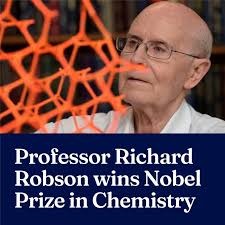Richard Robson, A Chemistry Professor At The University Of Melbourne, Has Won The 2025 Nobel Prize For His Work On Metal–Organic Frameworks (MOFs). His Discovery, Sparked By A Simple Classroom Demonstration, Has Revolutionized Carbon Capture And Environmental Sustainability Across The Globe.
A humble start to a global impact
Richard Robson’s journey to the Nobel Prize began not in a high-tech lab, but in a classroom. While teaching chemistry at the University of Melbourne, Robson used a basic demonstration to explain molecular structures. That moment of curiosity led to the development of metal–organic frameworks (MOFs), a class of materials now central to carbon capture and clean energy solutions.
Robson shares the 2025 Nobel Prize in Chemistry with Susumu Kitagawa and Omar M. Yaghi. Their collective work on MOFs has enabled scientists to trap carbon dioxide, purify air, and even extract water from desert air using crystal-like structures with microscopic pores.
MOFs: The future of clean chemistry
MOFs are celebrated for their versatility and efficiency. These porous materials can be engineered to trap specific molecules, making them ideal for environmental applications. From reducing industrial emissions to storing hydrogen fuel, MOFs are transforming how we approach sustainability.
Robson’s foundational research laid the groundwork for this innovation, proving that even a classroom experiment can lead to a global solution.
Key highlights:
- Richard Robson wins 2025 Nobel Prize in Chemistry for MOFs
- Discovery inspired by a classroom demo at University of Melbourne
- MOFs trap carbon, purify air, and extract water from dry environments
- Shared prize with Susumu Kitagawa and Omar M. Yaghi
- MOFs hailed as a breakthrough in sustainable chemistry
A Nobel moment rooted in simplicity
Robson’s reaction to the Nobel call was modest and memorable. “I did finish my fish. It was a bit cold, but I got there,” he said, reflecting on the moment he received the news. His story is a testament to how teaching, curiosity, and persistence can lead to world-changing discoveries.
As the world faces urgent climate challenges, Robson’s work offers hope—and a reminder that innovation often begins with the simplest of ideas.
Sources: MSN, India Today, NobelPrize.org

